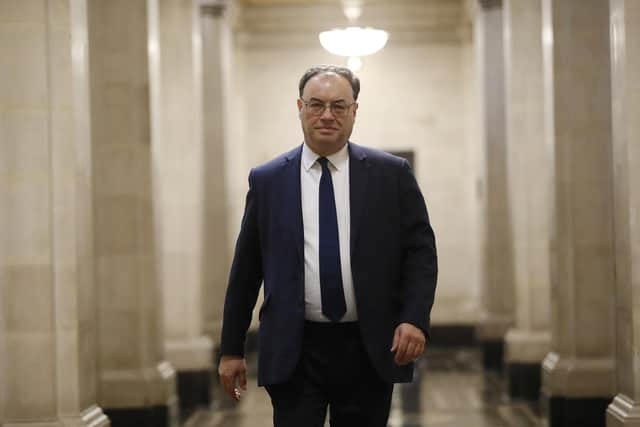World economic bodies warn UK over its financial path
Sterling fell back to 1.05 US dollars at one stage yesterday in reaction to emergency interventions from the Bank of England, after having recovered to 1.08 after Monday’s record-low value.
The FTSE 100 Index also fell sharply after opening on Wednesday, falling more than 2 per cent at one stage, appearing to head for its lowest level for more than a year.
Advertisement
Hide AdAdvertisement
Hide AdAndrew Bailey, the Bank of England’s governor, saw a sharp turn in the bank’s monetary policy which effectively brought down interest rates.


The intervention later saw the pound manage to recover ground and London’s top index was in the green.
It followed comments from the International Monetary Fund on Tuesday night which warned that Kwasi Kwarteng’s multi-billion pound tax-cutting plan would fuel inflation and inequality.
In a statement, the body openly criticised the Government’s economic plans, saying it was “closely monitoring” developments in the UK and was in touch with the authorities, urging the Chancellor to “reevaluate the tax measures”.
Advertisement
Hide AdAdvertisement
Hide AdIt came after Raphael Bostic, a senior official within the US’s Federal Reserve Banks said that the UK’s crisis was “not helping” avoid a global recession.
Earlier this week it was announced that Britain’s biggest banks will be stress-tested to see if they can withstand conditions more severe than the 2008 financial crisis.
Susannah Streeter, senior investment and markets analyst at Hargreaves Lansdown, said: “The IMF’s move has added to worries that the UK is fast taking on the characteristics of an emerging market economy, and risks ditching its developed country status.
“It’s now not only wracked with trade disruptions, an energy crisis and soaring inflation, but it’s also being closely monitored by the international body known as the world’s lender of last resort.”
Advertisement
Hide AdAdvertisement
Hide AdCraig Erlam, senior market analyst at OANDA, said: “It appears everyone is unusually united in their objection to the Treasury’s tax-cutting plans at a time when inflation is almost 10% and rising.”
Despite Ms Truss’ pursuit of economic growth as its defining mission, polling yesterday from YouGov showed that 33 per cent of the public backed Labour to grow the economy, twice as many as chose the Conservatives.
It came as Charles Goodhart, the former Chief Adviser at the Bank of England, told Times Radio that you can “say goodbye to growth over the period from now until the general election” due to Ms Truss’ economic plan.
Crossbench peer and former Treasury minister Lord O’Neill of Gatley said investors and companies “all over the world” were “wondering what on earth is going on in the UK”.
Advertisement
Hide AdAdvertisement
Hide AdHe told BBC Radio 4’s PM programme: “This is a breathing room for the Government, in my view, to seriously think what on earth is it really trying to do and … this idea that you can just magically quadruple productivity by a tiny corporate tax policy reversal is at the core of why investors and companies all over the world, never mind here at home, are wondering what on earth is going on in the UK.”